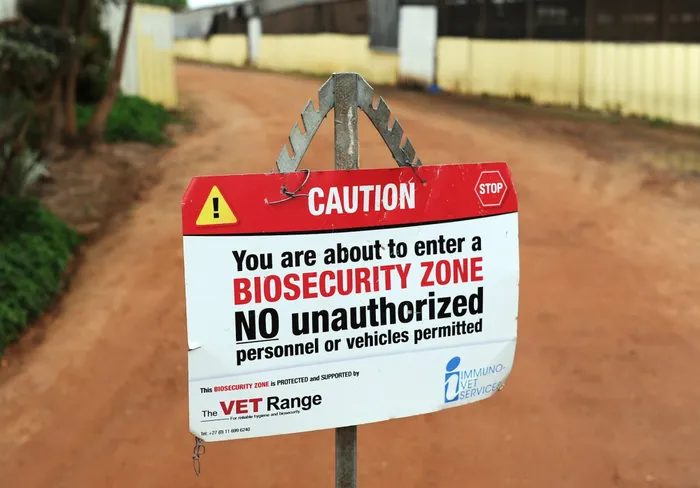Avian bird flu death toll sits at 1.4m chickens as SA outlines steps to see it through crisis

Dalrrd yesterday said in a statement the reported number of chickens that died due to the outbreak was 107 705, while 1 318 521 were culled, resulting in a total loss of 1 426 226 chickens. Picture Henk Kruger/ANA Pictures
South Africa faces a severe outbreak of avian influenza (AI), leading to the loss of more than 1.4 million chickens, devastating the poultry sector as the Department of Agriculture, Land Reform and Rural Development (Dalrrd) yesterday outlined key initiatives to handle the outbreak.
This as South African consumers say they are now being faced with empty shelves when purchasing eggs and chickens at their local supermarkets with fears of price hikes on the horizon.
Dalrrd yesterday said in a statement the reported number of chickens that died due to the outbreak was 107 705, while 1 318 521 were culled, resulting in a total loss of 1 426 226 chickens.
South Africa is currently dealing with a number of highly pathogenic avian influenza (HPAI) H5 and H7 outbreaks. Up to September 21, a total of 50 HPAI H7 outbreaks and 10 HPAI H5 outbreaks were reported.
Astral and Quantum Foods last week reported the devastation the outbreak has had on their businesses and profits.
Detailing measures in the face of the outbreak, Dalrrd said it had met with vaccine registration regulators and the agreement reached was that the registration of vaccines would be fast-tracked, but the safety, efficacy and quality would not be compromised.
“Due to the high probability of Avian influenza virus mutating and becoming zoonotic, care needs to be taken on the quality and efficacy parameters of the vaccine chosen for use in this exercise,” it added.
The criteria under which vaccination would be permitted was almost in its final development and only farms with good biosecurity and approved to vaccinate by the department would be given permission to vaccinate, it said.
The other requirements for vaccination would be surveillance to enable early detection of incursion and mandatory slaughter of vaccinated chickens.
The department further encouraged all producers to intensify their biosecurity measures on the farm.
It said the basic measures should aim at preventing contact with wild birds, including their faecal material, which could be transported in boots and equipment.
“Any suspicion of the disease must be reported immediately to the state veterinarian nearest to you,” it added.
Furthermore, the department had facilitated the importation of fertile eggs for the broiler industry, while a similar request for the table eggs would be considered if received. It was also facilitating the transit to Eswatini of fertile eggs for their broiler production.
The number of newly detected H7 and H5 PCR positive farms were increasing and industry was thus requested to ensure the utmost biosecurity on poultry farms to reduce the risk of introduction, Dalrrd said.
Anthony Clark, an independent analyst at Small Talk Daily, who analysis the agriculture sector, said in a note yesterday that the corporate effects of the worst outbreak of AI experienced in South Africa “is now taking its toll on the respective eggs and poultry sector”.
JSE-listed firms Astral Foods and Quantum Foods have both reported that AI has had a significant impact on their businesses.
“The market is jittery as the headless chicken reaction to Astral Foods update has seen its share price plunge,” Clark said, saying Astral Foods (shares) had been roasted near 20% in the past week in significantly above average trading volume.
These companies, already beset by crumbling and unreliable state infrastructure systems necessitating significant costs to produce the basic services needed like power and water, now must contend also AI and its impacts.
At the beginning of this month, Clark observed that RCL Foods had issued its financial year 2023 results with just a passing glance at AI. However, RCL was now commenting that eight of 19 farms in Gauteng were now infected.
Other countries are also battling AI, leading to a price spike as demand outweighs supply.
The latest data from the Pietermaritzburg Economic Justice and Dignity Group (PMBEJD) has revealed the price of a 10kg bag of frozen chicken rising by nearly 3% in just 30 days.
Fred Hume, the managing director of Hume International, said this price surge could be attributed to several factors, including non-tariff trade barriers, anti-competitive anti-dumping duties, and local supply challenges exacerbated by a bird flu epidemic.
Hume said, “In the past two weeks alone, clients in the industry have reported that chicken prices from local suppliers have already jumped as much as 15% in the past two weeks in response to growing supply pressures. And given lengthy lead times for food supply chains, we are likely to only see the full impact of decreased imports and the pressures on local producers within the next two to three months.”
Speaking on SAFM on Friday last week, South African Poultry Association (SAPA) general manager Abongile Balarane said the birds that were lost/culled was around 5 million.
BUSINESS REPORT